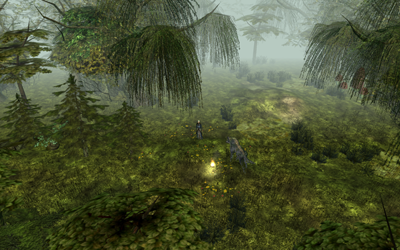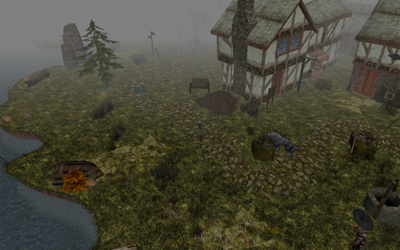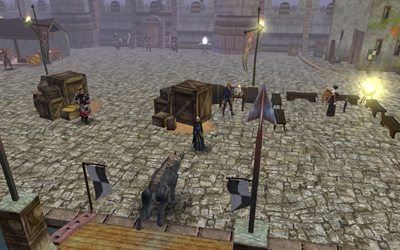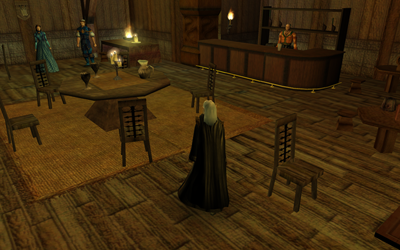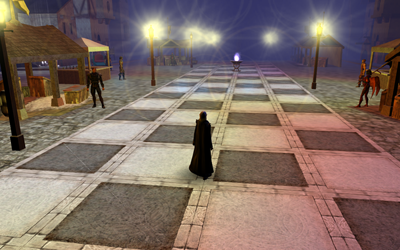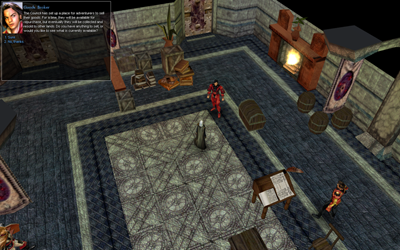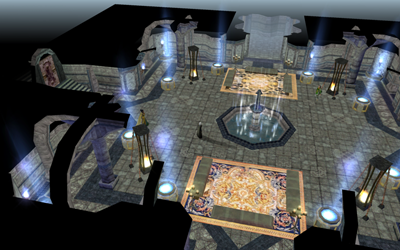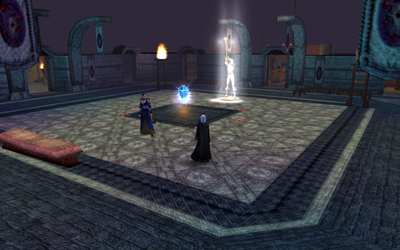This is the second post in a series that will look at different components of the amorphous blob called society and how they're relative to Shadows & Silver and to realistic game worlds in general.
Last time we discussed racism. Today's topic: Gender Roles.
I remember when one of my college history courses covered the American feminist movement. At one point the professor asked for all the girls in the class that were feminists to raise their hands. Out of the 70 or so girls in the class, only two did.
"Do you mean to tell me," the professor asked, "that only two of you are in favor of a woman's right to vote or to own property or have any legal status whatsoever?"
One student responded, "Well, everybody wants that. We just mean we're not bra-burning lesbians."
As society has rolled along, feminism has moved from the equal rights movements of the turn of the century to the militant feminism of the 60's and 70's to the emphasis on democratic reform we find so often today. Feminism today has different implications than it has in the past. But while the connotations and specifics have changed, the overall situation remains the same. After millennia of struggles, try as we might, there's still gender inequality, both
de facto and
de jure, both at home and abroad.
Curious, then, how we seem to conquer the issue so easily in fantasy worlds.
Perhaps it's the idealism that finds its way into fantasy, the same sort of worldview that results in black and white depictions of morality. Surely, if the land espouses all that is noble and just, it will support equal rights for women and everything will be wonderful, right? In fantasy we so often seek to fix the ills of society only to replace them with ham-fisted lessons about how good will triumph over evil. We force contemporary worldviews on a society apparently so backwards that it's managed to remain in a feudal state for thousands of years, then don't even stop to think about the implications. If your fantasy world doesn't assume gender stratification, you're missing a valuable opportunity for roleplay and powerful storytelling.
How did gender stratification begin? Sociologists usually assume it was a natural outgrowth of biological capabilities: men, being stronger took on the role of provider and protector, while women, as the bearers of children, took on the domestic roles that kept them close to home, protected as a valuable resource in the continuation of the species. Social evolution, in other words. Those societies that didn't develop in this way put women at risk, decreasing the chance that enough women would bear children for the society to survive.
This makes sense for a hunter-gatherer society, but why should gender stratification still exist after society transitioned to agriculture and the need for dangerous hunting was removed? And, even more vexing, why does it still exist in contemporary society where women are just as physically qualified as men for most jobs?
We can find one possible answer within Conflict Theory, a sociological discipline which was introduced by Karl Marx in
Das Kapital. Marx focuses on the relationship between the bourgeoisie (business owner) and the proletariat (worker). The former controls all the wealth and power while the latter can only obtain wealth and power by serving his bourgeois master. The classes are therefore in conflict; the stronger exploits the weaker to increase his own wealth. We can extend the theory to gender roles: the man, supported by his physical power, exploits the woman. In a world dominated by men, women can only succeed where they bend to men's will, thus making the men even stronger.
Conflict theory is not the only answer we might turn to, however. Talcott Parsons expands on Emile Durkheim's theory of Functionalism, which states that society is the way it is because things serve a useful function. That stratification serves a useful function in the survival of hunter-gatherer humanity is not in dispute, so what function might the contemporary or agrarian society have fulfilled with gender stratification? We might suppose that, through evolution (whether social or biological) women were better suited to fulfilling a more passive role in society, having traits that made them better at their role. The theory goes that women are (whatever the bra-burning lesbians argue) more suited to the careful and nurturing role than are men.
People often bristle when they hear this statement. It's important to make the distinction, though, that we're talking about advantage, not about necessity. What do I mean? Simply that just because a woman's hormones and physical structure make her gentler doesn't mean that she
should serve as a housewife, seamstress, or other passive role. It only means she is more capable of it than a man, whose biology and physiology makes him harder, less patient, and more aggressive.
But surely, nature is not all there is to the debate. There's nurture as well: how society has sculpted our personalities, our identities, and our view of gender roles. Girls like pink not because there is some biological imperative that says they must, but because society
tells them they should like pink. The same goes for boys and blue. You're ostracized if you deviate from the norm. (The most formative socialization of this sort that occurs is in childhood interactions. As adults, we often decide we'll do what makes us happy, and to hell with the world if it doesn't like it. As children, though, we have a deep psychological need to feel included, part of a larger group. Hence why being popular is so important in high school and so un-important in later life.) Functionalism tells us, though, that society evolved its roles because they fit the biological and social needs of the time. So the perceived social role is only important to society in that it fulfills a need.
But wait! Do those old social roles still fulfill a need? Different cultures stem from different societies, so, surely, sometimes they do. In contemporary America, though, society has changed dramatically. The family structure is beginning to disintegrate. Our divorce rate is over 50%, and more than 25% of American children live in single-parent homes. In addition, the living standard of the average American family is dropping dramatically, requiring even married partners both to leave the home and work just to break even. More and more, the role of the woman as the caretaker of children is exchanged for the role of provider and, unfortunately, she still is not seen as capable of providing, though necessity dictates she must be.
We can't solve the ills of society in a little blog post. But, by extension, neither can we solve them in a game. And really, should we? If conflict is the center of storytelling, isn't the base conflict of woman versus the limitations of society compelling? I've seen character backstories by the truckload that deal with a woman being driven to a life of adventure to escape the chains of an arranged marriage, and nine times out of ten, the conflict stops there. Women in fantasy, it seems, are only chained by society at some distant point in the past. They make a decision to not be the puppets of men and then everything is roses from there. Surely, fantasy is a wondrous thing!
How can we change this? How can we be more compelling?
It starts off small. A little incredulity on the part of men upon seeing a woman out of her socially accepted role goes a long way. She may be ostracized by some or thought incompetent at the least. And some may think her blasphemous. In a society where women are seen as fit only to bear children, cook, and clean, what else would you expect? Those who assume a more egalitarian stance should be few and far between. Men are pricks, and they should be portrayed as such.
In S&S, the treatment of women varies. In Adunay, though, women are barred from serving in the military (except in the capacity of a secretary or nurse), are not admitted to universities, and are rarely if ever allowed to work in professional roles. In the city, most women do menial labor in factories, hire out as servants, or become prostitutes. Those who show exceptional ability may become a nurse, but that's about as far as they can go in the workplace. Even upper class women are treated as second-class citizens. A woman can own property only as long as she is unmarried and has no brothers or sons over sixteen; in those cases, the husband, brother, or son owns it. A woman who inherits money often chooses to stay unmarried to retain legal independence. This, of course, relieves her of whatever good reputation society allowed her to have in the first place.
Being a woman in S&S takes strength. Being a woman and an adventurer, doubly so. The conflict that births that strength should be played up, not down; such resolve in the face of injustice is the thing people tell stories about long after things have changed... if they ever do.
